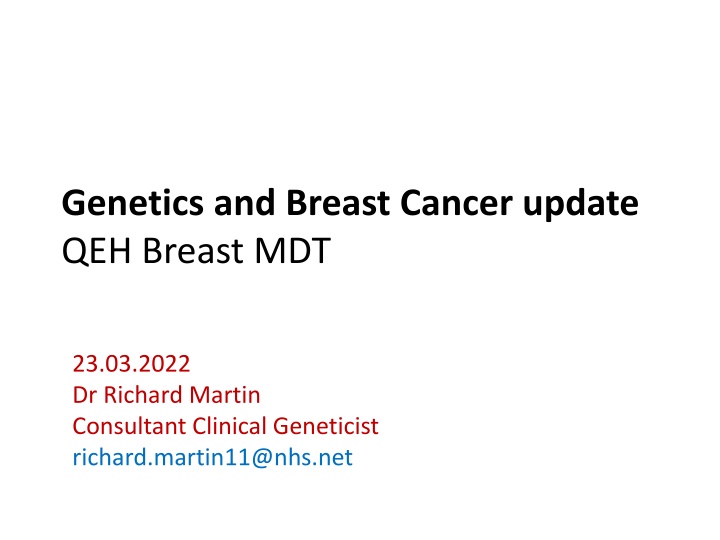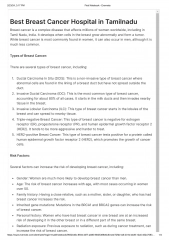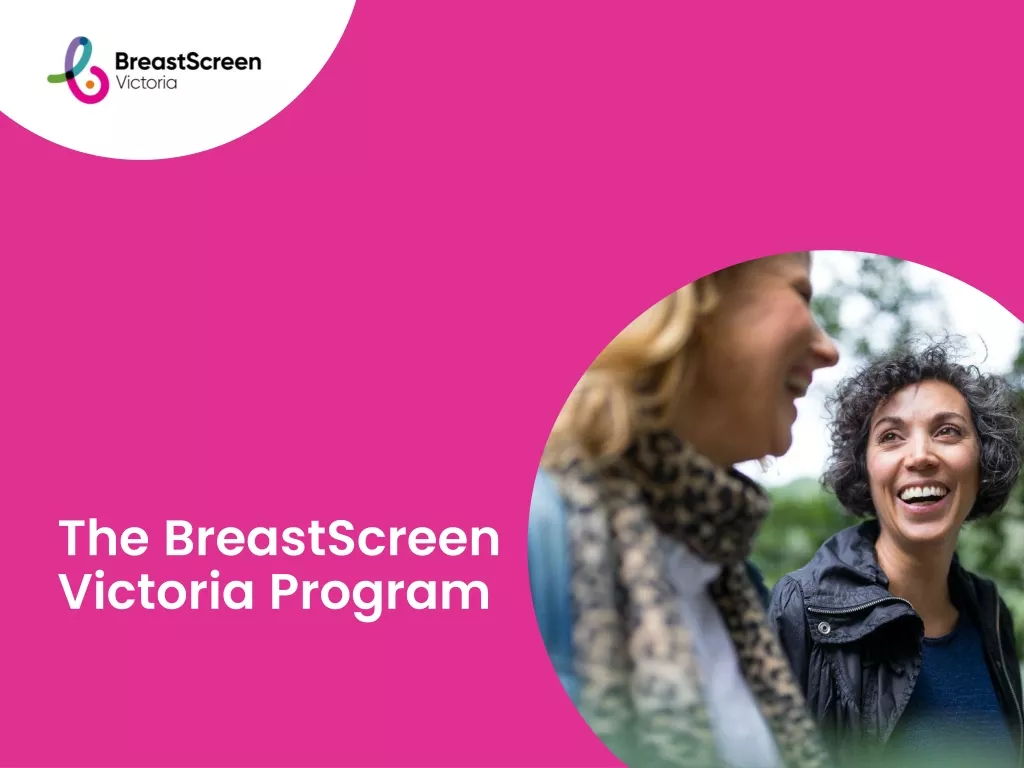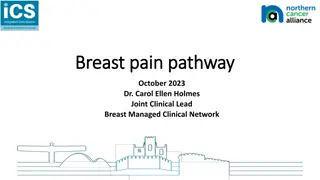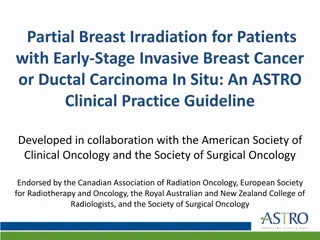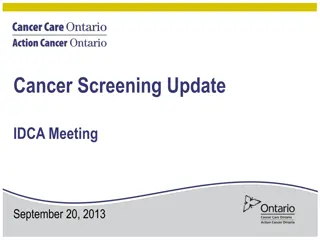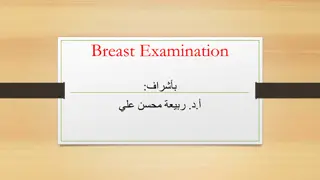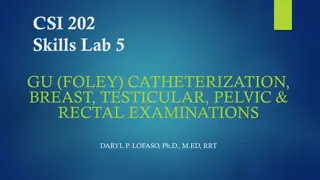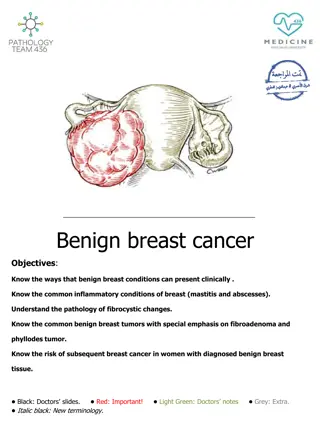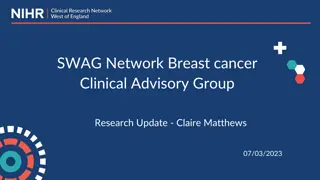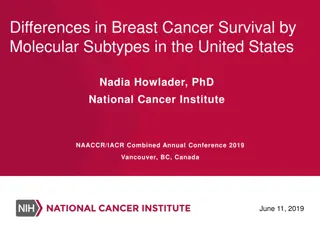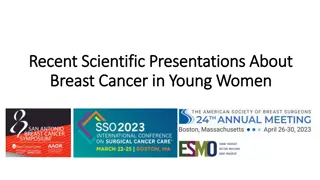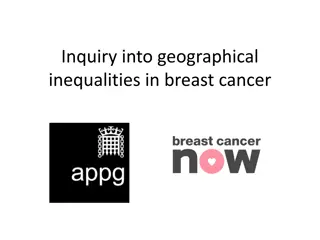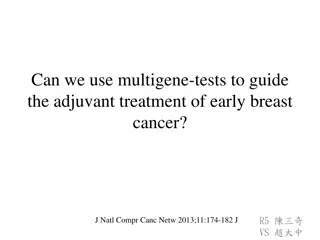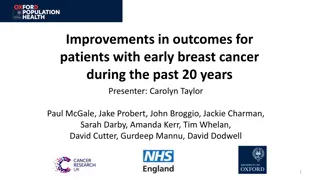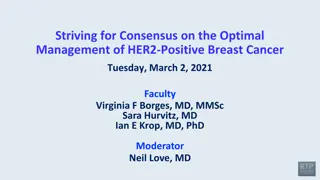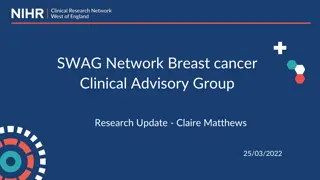Breast Cancer Genetics Update - Referral Criteria and Recommendations
This update discusses referral criteria for genetic testing and screening in breast cancer cases, including eligibility factors and advice for family members. Learn when to refer unaffected individuals with a family history and examples of referral scenarios based on genetic testing criteria. Stay informed about the latest developments in breast cancer genetics.
Uploaded on Feb 15, 2025 | 0 Views
Download Presentation

Please find below an Image/Link to download the presentation.
The content on the website is provided AS IS for your information and personal use only. It may not be sold, licensed, or shared on other websites without obtaining consent from the author.If you encounter any issues during the download, it is possible that the publisher has removed the file from their server.
You are allowed to download the files provided on this website for personal or commercial use, subject to the condition that they are used lawfully. All files are the property of their respective owners.
The content on the website is provided AS IS for your information and personal use only. It may not be sold, licensed, or shared on other websites without obtaining consent from the author.
E N D
Presentation Transcript
Genetics and Breast Cancer update QEH Breast MDT 23.03.2022 Dr Richard Martin Consultant Clinical Geneticist richard.martin11@nhs.net
Referrals affected New first diagnosis Historical diagnosis New second primary unaffected (with significant family hx or familial gene alteration) Short term Genetic testing/family hx may alter up front surgical / radioTx options Short term Genetic testing/family hx may alter up front surgical / radioTx options Longer term Screening ?Ov ca risk Advice to family members Risk reducing options Longer term Screening ?Ov ca risk Advice to family members Risk reducing options Longer term Screening ?Ov ca risk Advice to family members Risk reducing options Longer term To inform risk group and screening and risk reducing options
Who to refer? Unaffected women with a family hx as follows: The following women should be referred to Clinical Genetics for an assessment about their eligibility for additional breast screening. A woman with: A first degree relative (FDR) with breast cancer under the age of 40 A first degree relative with male breast cancer Two first degree relatives with breast cancer One first and one second degree relative with breast cancer One first degree relative with bilateral breast cancer One relative with breast cancer and one with ovarian cancer (one must be first degree) Two relatives with ovarian cancer Three or more relatives with breast or ovarian cancer Notes 1. If the consultee has breast cancer and residual breast tissue, count as a FDR 2. An affected female second degree relative through a male relative is equivalent to an FDR In a nutshell one breast >40 OR one ovarian cancer doesn t meet referral criteria everything else does
Who to refer? example 1 breast ca 62 breast ca 49 38
Who to refer? example 2 breast ca 62 breast ca 39 38
Who to refer? example 3 breast ca 62 breast ca 52 breast ca 49 38
Who to refer? example 4 breast ca 62 ?ovary / ?cervix ca 52 breast ca 49 38
Who to refer? Affected women (and men) who might meet genetic testing criteria (or who simply meet previous screening criteria): URGENCY If likely to meet test criteria AND If knowing they carry a very high risk gene mutation would change management and indeed when it would change management. Complex and depends on lots of factors!
Risk groups Population High Very High Moderate gene carriers family history family history Screening; (chemoprophylaxis) Screening; Chemo- prophylaxis; (Surgical risk reduction) Screening; Chemo- prophylaxis; Surgical risk reduction
Aims of genetic testing after bc diagnosis Short term To know whether the patient carries a very high risk breast cancer gene change To guide risk estimates of developing a second separate breast cancer over their lifetime May influence primary surgical and radiotherapy decisions Avoidance of radiotherapy in TP53 carriers Longer term Is there a high risk of associated cancers for which screening or risk reducing options are available? To guide information and advice to other family members Future To guide chemotherapeutic options
Genetic testing in breast cancer BRCA1 BRCA2 BRCA1 Current practice PALB2 BRCA2 Others* BRCA1 BRCA2 PALB2 *ATM, CHEK2, PTEN, TP53, STK11
Timeline for BRCA testing Week 0 1 2 3 4 5 6 7 8 9 10 11 12 13 14 15 16 17 18 19 20 Breast cancer plus FHx Family history work up Offer appt See and activate genetic test; results ref T neg bc <60 standard See and activate genetic test; results Offer appt ref Rapid BRCA pathway ref In breast clinic
DNA storage DNA can be extracted from a blood sample and stored for many years in our lab Then potentially used in the future (with patient s explicit consent) to activate specific genetic tests Useful for urgent samples and/or for patients who might prefer a telephone appointment with us; or for terminally ill patients to benefit their families. Need approx. 3mls purple (EDTA) tube in the form below need to tell patient this is not being tested just stored
Genetic testing? Breast specialists can now request genetic testing (BRCA1, BRCA2 and PALB2) when test directory criteria are met You would have to Be able to take and record informed consent Send blood sample and request Molecular Genetics lab to activate these tests and report to you directly Know how to deal with the results, including referring to Clinical Genetics if a mutation is identified (or a VUS* identified) Refer to Clinical Genetics regardless of results, if family history criteria met Refer any lady aged 30 and under at diagnosis to Clinical Genetics regardless to discuss genetic testing (only Clinical Geneticists can request TP53) * VUS = variant of uncertain significance
Future ways forward Very happy to discuss! We have 2x cancer genetics consultants; 8-10 GCs; covering Cumbria/NE/Tees (approx 8 breast MDTs) Blood DNA storage Family hx questionnaires RVI model including monthly joint clinics National plans for Genomics education +/- local adaptation We need to improve web based resources Regional approach / Cancer Alliance On call enquiry email: nuth.GeneticCounsellorEnquiries@nhs.net
